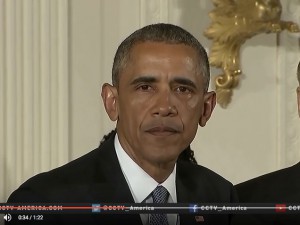‘Every time I think about this,
it gets me mad’
This is my own, personal story about the everyday power of the US gun lobby, the National Rifle Association (NRA), a very old organization that has been lobbying for the US gun-manufacturing industry in Washington since 1975.
As a young man at summer camp, I actually earned NRA certificates for marksmanship. I still have my NRA sharpshooter medallion with three metal bars, indicating that, lying prone and sitting, I could adequately aim, shoot and hit a paper target five times with a .22 long rifle. It was a sport, and I had no illusions or fantasy that it was anything more or less than sport. Above all, I was taught that the barrel of that rifle was to remain pointed down-range, and any breach of that protocol would have gotten me kicked off the range.
Imagine my surprise when, years later, a representative of the NRA is calling one of my employers to complain about an article I wrote.

January 5, 2016 – US President Barack Obama, taking a brave stand against US gun manufacturers and their powerful lobbying organization, the NRA.
The article was about wildlife conservation practices 100 years ago and how they changed, probably during the administration of Republican President Teddy Roosevelt (1904-1908). Citing solid historical sources, my article stated that the first mission of federal, state and local wildlife-control agents once was exactly that: to hunt, trap and kill animals, like wolves, that threatened ranch- or farm production or hurt local fishing and hunting.
Eventually, of course, community and government wildlife conservationists came to understand the value of predators to a local ecosystem. Using more sophisticated analyses, they put tighter controls on their own hunting and trapping of animals, and created more wildlife refuges where nature might take its course, sometimes acting as an incubator of hunting and fishing game. This isn’t rocket science. Nor is it my own interpretation of history. It’s just the way things happened. Using my client’s own historical sources, I recorded these facts and the organization printed them in an internal newsletter — for its own employees.
Some time after publication, I was chatting with a leader of the organization, who told me he had received a call about my article from someone at the National Rifle Association. This person directly challenged my employer, saying the article “proved” that his organization was “anti-gun.”
My employer’s organization was high-profile. It was a good client for me, and they liked my work. He told me he was used to this game in Washington — getting calls just like this one from the NRA, likely coming from some eager just-out-of-college intern.
My client painted a picture for me: a big call center of young conservatives, combing through thousands of newsletters like the one in which my article appeared. A virtual “Ministry of Truth.” The job of these young “go-getters,” he suggested, was to find something/anything that could be politicized to support their cause — more gun sales — and, finding it, initiate the call. In this case, the “target” happened to be my reporting, my writing.
To his credit, my employer shared all this with me, and I was grateful that he was able to make light of it. At the same time, I was never signed on to write another article for that publication. In my mind, at least, the NRA had successfully politicized my work as a writer of (relatively boring) historical fact.
As one of my characters in Carla Rising says, “You call me a ‘radical’? Well, who made me a radical?”
For me, at least, there was a chilling effect by that one, single phone call by that NRA rep — likely one of thousands during the polarizing US “cultural wars” of the 1990s, I’m sure.
Openly expressed, or not, the subtle but very real message from the NRA to US citizens, both NRA members and non-members alike, has been this:
“You may be — or may not be — ‘pro-gun’ or ‘anti-gun.’ Nothing in your actual past matters. Your membership doesn’t matter. Your NRA sharpshooter badge doesn’t matter. Today, we have the money; we have the power. We have an army of lobbyists, in Washington and elsewhere. We have the guns. We have the media clout. We define the political issue and the story. We are the judge.”
With leaders like this American president — and those of us who stand with him — tomorrow’s story will be different.
